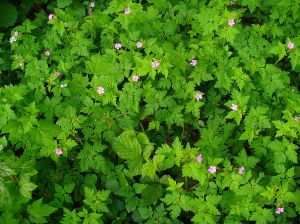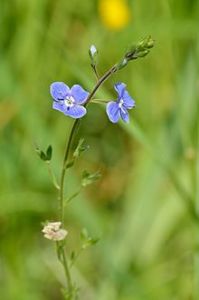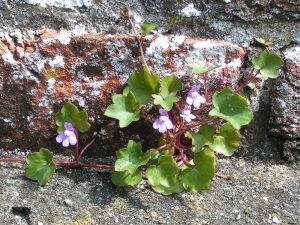While wandering lonely as a cloud and all that, I noticed an outbreak of one my favourite wild flowers fighting for existence along the edge of the footpath. This flower, which I believe may be part of the geranium family, is called Herb Robert. It will have a Latin name as well, no doubt, but I don’t need to know that.
[I believe these pictures were taken by AnRo0002]
I have a weakness for wild flowers which tend to the delicate, and that can cause problems. For example, I have two lawns (sorry, Gerard) and a grass verge, all of which host colonies of that delightful flower, Veronica. So when I come to mow the grass I spend much time and effort guiding the mower around them and the job takes much longer than it otherwise would. In doing this I am reminded of Robert Frost’s poem, The Tuft of Flowers. (The content of this poem is interesting but the expression somewhat clunky.)
And every year, I rejoice in the reappearance of ivy-leaved toadflax along a certain wall – unlike the criminal who attacks them with weed killer. Why does he do that? What harm is it doing him? Ivy-leaved toadflax takes root in crevices in walls and somehow thrives on practically no soil at all, so its life is hard enough without human intervention.
I am beginning to wonder what chance these plants have in an environment dominated by people.
Frost’s poem is in couplets, as it is in my draft, but when I publish this post the couplets disappear. I have no idea why.
The Tuft of Flowers





